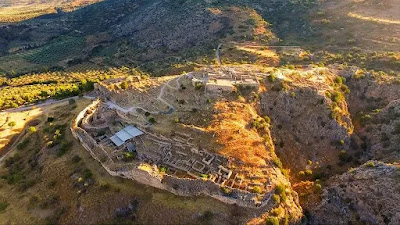The following article was © Provided by TheTravel and written by Aaron Spray. Google Images provided by Who's ? Right blog.
- Mycenae, once thought to be mythical, is now one of Greece's greatest archaeological sites. (Bronze Age Greece, Modern Country: Greece)
- The ancient city of Babylon, mentioned in the Bible, was discovered near Baghdad in Iraq. (Babylonian Civilization, Modern Country: Iraq)
- Troy, the counterpart to Mycenae in Homer's Iliad, has been identified in Turkey south of Istanbul. (Trojan Civilization, Modern Country: Turkey)
Ancient history is shrouded in myth and legend, and picking the real from the fictional is tricky at best. Sometimes, legendary cities turn out to have actually existed (at least in some form), while other legendary places like the biblical Sodom and the ancient Greek mythical city of Atlantis remain debated.
It was once thought that great Bronze Age cities like Mycenae were mythical, but they have been found to have been real (Mycenae was one of the greatest Greek cities of its time). Here are ten legendary cities that turned out to be real.
Related: These Are 10 Of The World's Now Not-So-Lost Cities
Babylon
 |
| Ruins of Babylon, Mesopotamia, Iraq |
Babylon is extensively referenced in the Bible but had been thought to be mythical until it was discovered near Bagdad in Iraq.
Civilization: Babylonian
Modern Country: Iraq
Mycenae
 |
| Ancient Site of Mycenae |
Mycenae was one of the greatest Bronze Age Greek cities and was at the center of Homer's epic poem, the Iliad (about the Siege of Troy).
Agamemnon was the king of Mycenae and led the campaign against Troy in the story. It was thought to have been a myth, but now it is one of the greatest archeological attractions in Greece.
Civilization: Bronze Age Greece
Modern Country: Greece
Troy
 |
| Archaeological Site of Troy |
The Iliad counterpart to Mycenae is Troy. It had been thought not to exist, but now researchers are somewhat confident that it has been identified in Turkey south of Istanbul.
The archeological site of Troy is open to the public and has many layers of successive cities.
Civilization: Trojan
Modern Country: Turkey
Related: Where The Ancient City Of Troy Is Located Today, And What Visitors Can Do There
Vinland
 |
| Archaeological Site of Vinland |
Vinland is the mythical land to the east found by Viking explorers and settlers from Greenland.
For a long time, this story was thought to have been mythical until the abandoned Viking settlement was found at L'Anse aux Meadows in Newfoundland, Canada, in 1960. It turns out the Vikings beat Christopher Columbus to discover and settle the New World exactly 1,000 years ago.
Civilization: Viking
Modern Country: Canada
Ninevah
 |
| Archaeological Site of Ninevah |
The scholarly skepticism of the existence of Babylon extended to the Assyrian Empire and the city of Ninevah. Ninevah was the ancient capital city of Assyria and is located in modern-day Mosul in Iraq.
For a period, it was the largest city in the world. It was mostly abandoned by the 13th century AD and was only rediscovered in the mid-19th century.
Civilization: Assyria
Modern Country: Iraq
Hattusa
 |
| Archaeological Site of Hattusa |
Hattusa was the impressive capital of the ancient Hittite Empire in central Turkey (also believed to have been a myth).
It became an early UNESCO World Heritage Site in 1986 and is among the oldest archeological attractions to have on the bucket list in Turkey.
Civilization: Hittite
Modern Country: Turkey
Heracleion (Or Thonis)
 |
| Archaeological Site of Heracleion |
Heracleion was an ancient Egyptian port city near the mouth of the Nile, around 20 miles from Alexandria. Its existence is known from ancient accounts, but scholars were skeptical.
That is, until it was found that, like Atlantis, it had slipped below the waves in the Mediterranean. It is now over 7 kilometers or 4 miles off the coast and under 19 feet or 6 meters of water.
Civilization: Ancient Egypt
Modern Country: Egypt
Related: The Atlantis of Egypt: Meet The Lost City of Heracleion
Assur
 |
| Archaeological Site of Assur |
Assur, or Ashur, was another of the great cities of ancient Assyria. It was the capital of the Old Assyrian Empire and, for a period, the Neo-Assyrian Empire.
Its limited remains are found on the western bank of the Tigris River in northern Mesopotamia in Iraq. It is around 60 miles south of ancient Nineveh.
Civilization: Assyria
Modern Country: Iraq
Great Zimbabwe
 |
| Archaeological Site of Great Zimbabwe |
Great Zimbabwe is one of the most important and largest archeological sites in Southern Africa, and it could have been home to up to 18,000 people.
It was reported by early 16th-century Portuguese traders who heard stories of the ancient site, but the tales of a great non-European fortress were dismissed by Europeans until it was discovered in the 19th century and documented.
Civilization: Ancestors of the Shona
Modern Country: Zimbabwe
Related: Touring Great Zimbabwe: The Lost City of Africa
White City / La Ciudad Blanca
 |
| Archaeological Site of White City |
When the Spanish arrived in Central America, there were tales of a city hiding a great amount of wealth in the jungles of Honduras. The early Spanish Conquistador Hernan Cortes sought it but did not find it. In 1936, it was claimed the legendary city was found in the Mosquitia region of Honduras.
These days, a number of sites have been found, and the suggestion is the legendary White City could have been any one of them.
Civilization: Pre-Columbian Mesoamerica
Modern Country: Honduras
No comments:
Post a Comment
Thank you for your feedback!